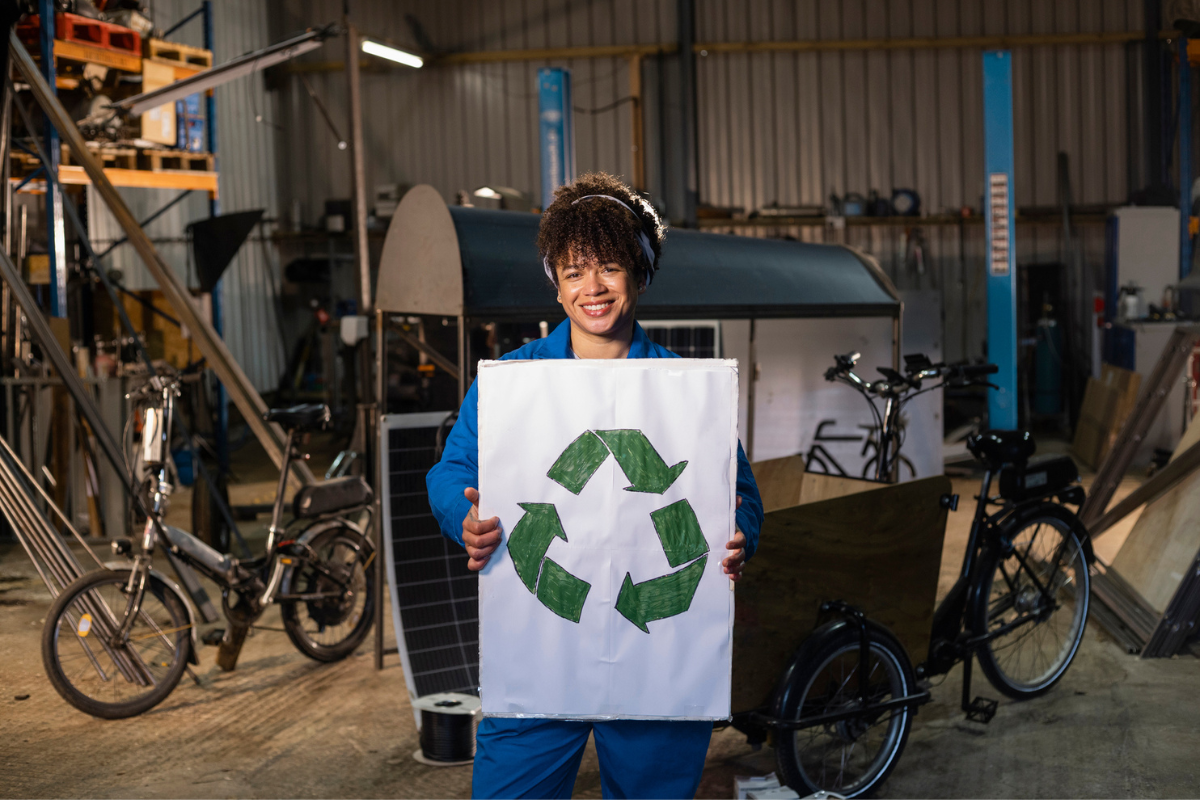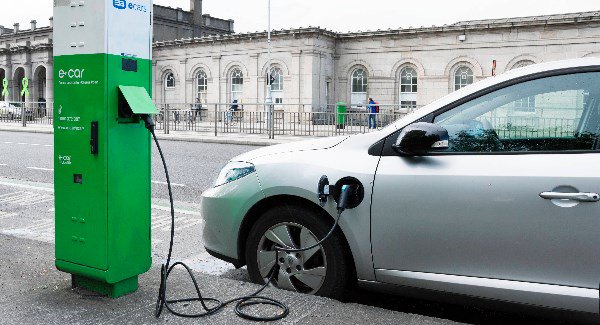1 min read
Ireland To Ban Sale of Diesel and Petrol Cars from 2030
Government drive to ban sales of diesel and petrol cars in Ireland by 2030 The Irish Government is drafting radical new laws that will see the sale...
6 min read
Caroline Geoghegan : Jan 16, 2023 11:27:29 AM

A lot of the items that many of us consider to be rubbish or no longer fit for purpose such as left over food, going out of date fruit or veg, old clothes or even construction or DIY waste, are being thrown out when they could so easily be put to other use, reupholstered, or reimagined into what we used to call at home “miscellaneous dinners”, while certain items could be recycled back into the economy.
Just how is Ireland doing in terms of adopting a more sustainable approach to re-using or refurbishing the products and services we use in both our domestic and corporate lives?
“A creative movement connecting people, ideas and resources to support greener low-carbon living.” - The Rediscovery Centre for the Circular Economy in Ireland.
The Rediscovery Centre is the newly established national centre for the Circular Economy.
Put simply, it’s a way of living which aims to eliminate waste and pollution.
This wholly sustainable or circular way of living is achieved by maximising the lifetime of products and materials - and in certain cases services. The remit of the Rediscovery Centre is to lead the change, to act as a guiding light for the circular economy by providing real-time, real-life practical advice, for both home and business environments.
The Rediscovery Centre has the requisite skills to enable ‘clients’ to fully understand and engage with the Circular Economy in Ireland. In offering practical supports to help with repurposing or refurbishing items heretofore destined for landfill, the centre collaborates with people in such a way as to make them part of the sustainable solution.
“In a circular economy, waste and resource use are minimised and the focus is to reduce our consumption-based emissions. The use and value of products and materials is maintained for as long as possible. When a product has reached the end of its life its parts are used again and again – to create further useful products, instead of being discarded which is an all too familiar pattern now.” - Ossian Smyth, Green Party TD & Minister for the Circular Economy.

Itself based in a repurposed boiler-house situated in Ballymun, in that alone the Rediscovery Centre clearly demonstrates what can be done with the most dilapidated of things. In taking a ruinous old building and turning it into a state-of-the-art office, conference and meeting space, the centre displays a commitment to sustainability and environmental protection.
Essentially the core message when it comes to areas like building and construction for instance, is that we most certainly should not be knocking down or demolishing old or neglected buildings. Rather than being discarded, used or old materials should be saved and reused for the purposes of housing as well as building infrastructure such as walls or storage.
Itself based in a repurposed boiler-house situated in Ballymun, in that alone the Rediscovery Centre clearly demonstrates what can be done with the most dilapidated of things. In taking a ruinous old building and turning it into a state-of-the-art office, conference and meeting space, the centre displays a commitment to sustainability and environmental protection.
Essentially the core message when it comes to areas like building and construction for instance, is that we most certainly should not be knocking down or demolishing old or neglected buildings. Rather than being discarded, used or old materials should be saved and reused for the purposes of housing as well as building infrastructure such as walls or storage.
A recently published report commissioned by the coalition outlines ways in which we can all become more sustainable, in both our personal and business lives, by tapping into the Circular Economy.
It comes as no surprise that the report states that as a nation, Ireland is not where it needs to be when it comes to “Reuse, Reduce, Recycle”. While we are there or thereabouts when it comes to recycling, we are nowhere near our EU counterparts when it comes to the “reuse” and “reduce” elements. In fact, Ireland ranked an embarrassing second-from bottom in a recent EU survey of its member states’ actions for sustainability and engagement with the circular economy
The government policy lab, in conjunction with the Rediscovery Centre, is now seeking to engage with people working first hand with sustainable methodologies to see what can be done, on a national level, to improve the situation and our standing within the EU.
According to government spokesperson and Fine Gael party Chair Richard Bruton, the key is to...
“look at every link in the chain to remove the environmental damage and that often starts right upstream with the design of a building, the materials used, right through production, retail, to the choice consumers make and to habits - both domestic and corporate - on discarding (so-called waste).”
When it comes to how differing sectors are doing in terms of repurposing materials the worst by far is Building and Construction. Constant research has proven that the construction industry - as whole - has the lowest rates of reuse and recycling. “As a whole” incorporates the whole process chain from material extraction and production through to building waste management and demolition. Bear in mind that it’s only in the last five decades, and mainly in this century, that architecture has begun working to green credentials (when architects began to realise the environment damage glass skyscrapers, with their reliance on large-scale cooling and heating systems, were doing.
Members of the Irish construction fraternity need to look to their peers in countries such as Norway and Scotland where the emphasis is on using renewable and sustainable materials such as timber. Another way in which builders can improve their reuse/recycle practices is simply by using two skips instead of one, to aid regeneration. When it comes to ‘building waste’, identify one skip for recyclables and one skip for landfill, no reuse waste.
In an interview with RTE Drivetime, Mr. Bruton said that it would be beneficial if all involved, from architects to builders to project managers to clients could work together to adopt better and more sustainable practices.
Obviously, if there is an incentive to recycle more’s the better and according to Richard Bruton the incentive comes from using materials and processes that are sustainable in the long term meaning increased industry efficiencies. While that may be something of a carrot, the government is considering a potential stick by way of imposing a levy or fine for those industries that deliberately eschew their environmental responsibilities by putting immediate profit over long-term national reward (of a greener, clean and healthy environment).
When it comes to how differing sectors are doing in terms of repurposing materials the worst by far is Building and Construction. Constant research has proven that the construction industry - as whole - has the lowest rates of reuse and recycling. “As a whole” incorporates the whole process chain from material extraction and production through to building waste management and demolition. Bear in mind that it’s only in the last five decades, and mainly in this century, that architecture has begun working to green credentials (when architects began to realise the environment damage glass skyscrapers, with their reliance on large-scale cooling and heating systems, were doing.
Members of the Irish construction fraternity need to look to their peers in countries such as Norway and Scotland where the emphasis is on using renewable and sustainable materials such as timber. Another way in which builders can improve their reuse/recycle practices is simply by using two skips instead of one, to aid regeneration. When it comes to ‘building waste’, identify one skip for recyclables and one skip for landfill, no reuse waste.
In an interview with RTE Drivetime, Mr. Bruton said that it would be beneficial if all involved, from architects to builders to project managers to clients could work together to adopt better and more sustainable practices.
Obviously, if there is an incentive to recycle more’s the better and according to Richard Bruton the incentive comes from using materials and processes that are sustainable in the long term meaning increased industry efficiencies. While that may be something of a carrot, the government is considering a potential stick by way of imposing a levy or fine for those industries that deliberately eschew their environmental responsibilities by putting immediate profit over long-term national reward (of a greener, clean and healthy environment).
The Rediscovery Centre offers businesses access to a wealth of information and skills training on the Circular Economy and how they can become active stakeholders in promoting sustainability and a cleaner environment.
A recent study carried out by the centre showed that only 1 in 4 Irish people have heard of the Circular Economy so that according to CEO Miller, there is some way to go to getting the majority of people on board with its mission. For this reason, the centre is working with the government to design a public awareness campaign to drive buy-in into one of the most important economic systems of our generation.
While we all know that fossil fuels are hugely detrimental to our
environment, many of us might not be aware that a large proportion, just
under 50%, of our emissions comes from other sources. The ESRI recently
published the results of a study that showed, quite alarmingly, that
our consumption choices generate 75% emissions than our production
activities.
By improving our rates of reuse, recycle - buying less, repurpose
more, we would significantly increase our contribution to climate action
whilst simultaneously helping to reduce Ireland’s climate impact.
There comes a time when less really is more,
and this is that time.
FREE DOWNLOAD

This resource will guide you through the process of an Energy Audit so you know what to expect.
An Energy Audit is often the first step to a more sustainable future for your business.

1 min read
Government drive to ban sales of diesel and petrol cars in Ireland by 2030 The Irish Government is drafting radical new laws that will see the sale...

Since the outbreak of war in Ukraine, the electricity system in Ireland has struggled to cope with a globally difficult situation.

In the midst of media buzz and a cacophony of opinions, one thing is clear: Ireland's 'Re-turn' initiative has ignited something unlike anything seen...